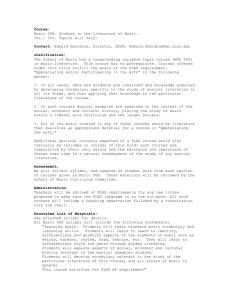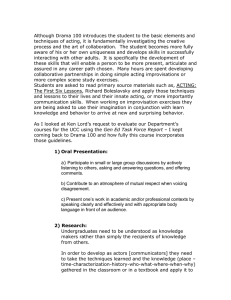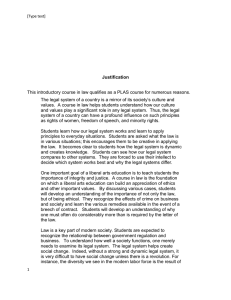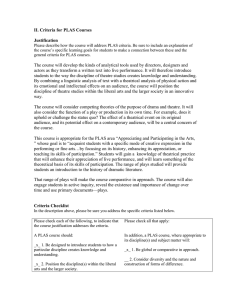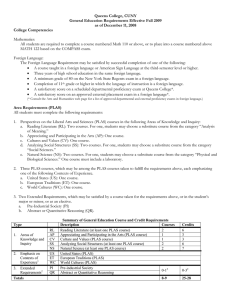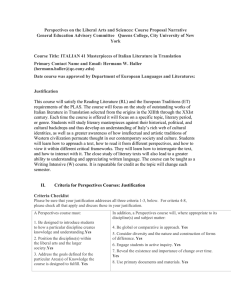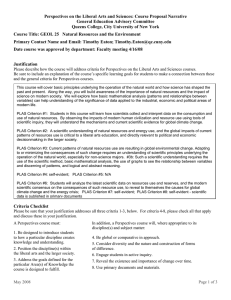II. Criteria for PLAS Courses Justification
advertisement
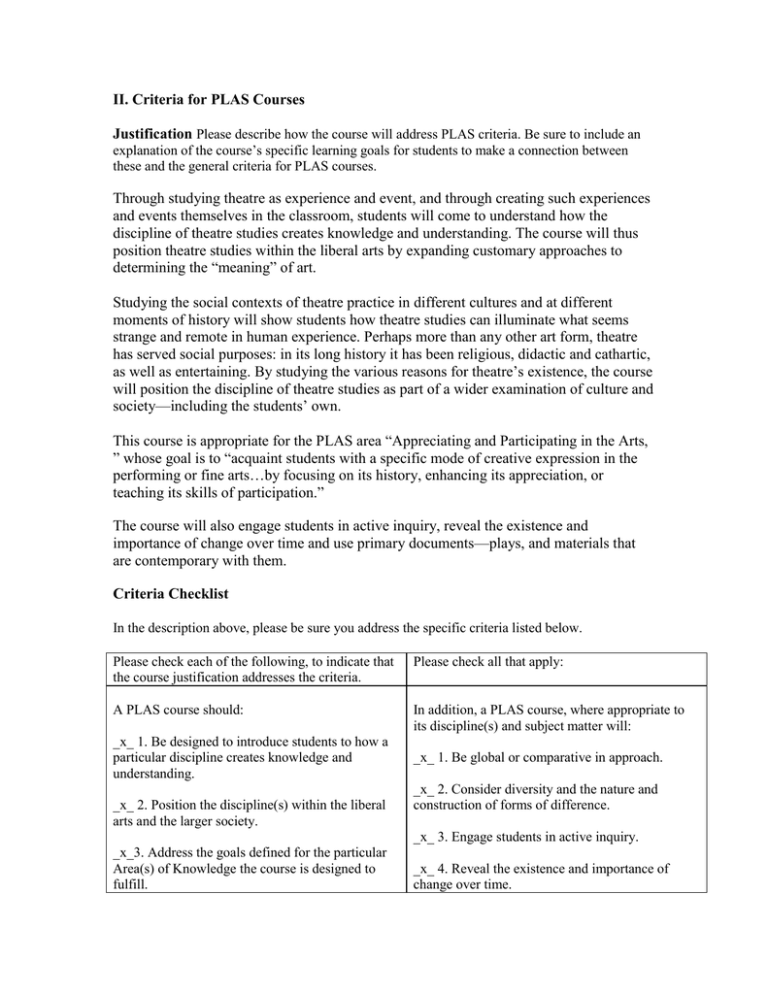
II. Criteria for PLAS Courses Justification Please describe how the course will address PLAS criteria. Be sure to include an explanation of the course’s specific learning goals for students to make a connection between these and the general criteria for PLAS courses. Through studying theatre as experience and event, and through creating such experiences and events themselves in the classroom, students will come to understand how the discipline of theatre studies creates knowledge and understanding. The course will thus position theatre studies within the liberal arts by expanding customary approaches to determining the “meaning” of art. Studying the social contexts of theatre practice in different cultures and at different moments of history will show students how theatre studies can illuminate what seems strange and remote in human experience. Perhaps more than any other art form, theatre has served social purposes: in its long history it has been religious, didactic and cathartic, as well as entertaining. By studying the various reasons for theatre’s existence, the course will position the discipline of theatre studies as part of a wider examination of culture and society—including the students’ own. This course is appropriate for the PLAS area “Appreciating and Participating in the Arts, ” whose goal is to “acquaint students with a specific mode of creative expression in the performing or fine arts…by focusing on its history, enhancing its appreciation, or teaching its skills of participation.” The course will also engage students in active inquiry, reveal the existence and importance of change over time and use primary documents—plays, and materials that are contemporary with them. Criteria Checklist In the description above, please be sure you address the specific criteria listed below. Please check each of the following, to indicate that the course justification addresses the criteria. Please check all that apply: A PLAS course should: In addition, a PLAS course, where appropriate to its discipline(s) and subject matter will: _x_ 1. Be designed to introduce students to how a particular discipline creates knowledge and understanding. _x_ 2. Position the discipline(s) within the liberal arts and the larger society. _x_ 1. Be global or comparative in approach. _x_ 2. Consider diversity and the nature and construction of forms of difference. _x_ 3. Engage students in active inquiry. _x_3. Address the goals defined for the particular Area(s) of Knowledge the course is designed to fulfill. _x_ 4. Reveal the existence and importance of change over time. _x_ 5. Use primary documents and materials. III. Course Materials, Assignments, and Activities Please provide an annotated list of course readings and descriptions of major assignments, exams for the course, and distinctive student activities that will engage students in working toward the course goals discussed in the course description and / or justification. (Feel free to use additional pages, if necessary.) Sample Readings / Course Texts Please include the following for each reading or text: Author, title Short description, including information about how the reading will contribute to course goals Aristophanes, Lysistrata The reading of the script would be supplemented with information on the historical practice of the play in its original context, contributing to the goals of (1) leading to a better understanding, interpretation, and evaluation of the material and its staging, (2) critical and useful participation in rethinking the play in terms of contemporary production, (3) development of aesthetic sensibilities through comparison and contrast of Attic Greek aesthetic concerns with those of a contemporary audience, and (5-9) group work and presentation of such work to the rest of the class resulting in improvement of communication skills, increased sensitivity to others’ values, experience in problem solving, the development of ability to cooperatively work in groups, and opportunity to reflect on self-interests and abilities. Assignments and Activities Please include the following information for each assignment or activity: Assignment prompt Source(s): List course readings and outside materials that will inform students’ responses to the assignment prompt Assignment goals (+ an explanation of how these help fulfill general course goals + PLAS criteria) Seeing a play at QC (for example, Playboy of the Western World) Source: Read the script, and research historical, social, and aesthetic background of the original production. Look at Synge’s other descriptions of this culture (in his travelogue, The Aran Islands, for example), in his recorded commentaries (letters to Yeats, memoirs, speech made at the Abbey Theatre defending the controversial aspects of the play, etc) Students consider accessibility of the drama to a contemporary audience in NYC. Assignment Goals: In studying the script historically and adapting a production to a different culture, students employ critical thinking and problem solving skills. In both the small group and class discussions of these materials, students develop communication skills, sensitivity to others values, the ability to work cooperatively, and explore aesthetic sensibilities. Group project presentation Source: Students choose a play from suggested titles and collectively demonstrate their research and creativity by presenting a scene from the play. In addition to enacting the roles, the group produces a written analysis of character, theme, and dramatic structure. The group also considers production of their conceptual work by considering venue and stage/audience configuration, budget, publicity, casting, and spectacle (costuming, scenery, props, sound, and lighting). Assignment Goals: Overall this cumulative project seeks to achieve a basic understanding of theatrical performance and its position as a synthesis of many arts— playwriting, acting, directing, design, music, and dance—leading to a better understanding, interpretation, and evaluation of creative works. IV. Assessment PLAS courses must be recertified every five years. What forms of evidence, to demonstrate that course goals are being achieved, will be collected over the next five years? How will assessment be conducted, i.e., who will oversee the course, suggest and approve changes, and design and collect assessment instruments? How might evidence of effective teaching and student learning be collected and evaluated? A comparison of a student’s early and later work will reveal whether the student’s understanding and skills are growing. Projects, exams and papers can show whether basic concepts are being communicated effectively. In addition, students can write course evaluations to address PLAS criteria. The course will be overseen by the full faculty (approval of initial content and methodologies), the departmental Curriculum Committee (initial approval and alignment with college curriculum in general), and term-by-term review by the departmental chair . In addition, the department can collect the following: • All syllabi for PLAS courses • Enrollment data for PLAS courses • Data on who is teaching PLAS courses (full-time faculty, part-time faculty, tenured faculty, untenured faculty). V. Administration Both full-time faculty and adjuncts will teach this course. Eight sections will be offered each semester. Consistency will be regulated as follows: the Chair will have the template/description for the class and brief any faculty who will be teaching the class, providing them with the PLAS documentation for the class and PLAS parameters. Monthly meetings with be organized with all faculty teaching the course and the Chair to discuss and implement student needs, course need
